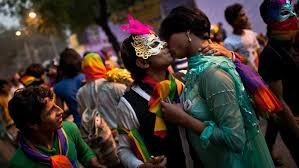Why India’s laws are still not LGBT+ inclusive
As the first anniversary of the landmark judgment decriminalizing LGBTQ relationships approaches, questions about what the future holds for India’s queer community are still somewhat up in the air.
Vidhi Centre for Legal Policy, an independent legal think tank, has released a report called Queering the Law: Making Indian Laws LGBT+ inclusive. They have analysed the how inclusive our laws are through four significant lenses – identity, violence, employment and family. The report identifies the laws that end up discriminating against the LGBT+ communities because they operate under notions of the binary of male and female or under the assumption that relationships can only be heterosexual.
Akshat Agarwal, Research Fellow of Vidhi Centre for Legal Policy and co-author of the report said, “While the decisions of the Supreme Court of India were momentous, it is now important to take the conversation forward and talk about the various laws that continue to exclude LGBT+ persons and deny their rights as equal citizens. This project in a small way aims to act as a resource to inform this conversation on inclusion.”
Their key findings include the ways in which gendered language renders transgender people invisible – for instance, our laws only operate under the categories of male and female, or only use male and female prefixes like Smt and Shri have no provisions for the inclusion of people falling outside the gender binary.
Legislation also use the terms ‘sex’ and ‘gender’ interchangeably, despite the Supreme Court having made a distinction between the two. Laws such as the Passport Rules and CBSE Bye-Examination rules still require medical proof of change of gender, despite this requirement falling short of the Supreme Court’s decision. Even when it comes to birth certificates, ‘male’ and ‘female’ are the only possible categories, and there is currently no provision to change one’s sex on their birth certificate, the report claimed. This means that “intersex people are invisibility,” according to the report.
When it comes to violence, LGBT+ people are excluded from criminal laws because they exist within the male-female binary, and because they assume relationships are solely heterosexual. For instance, Section 157 of the Code of Criminal Procedure lays down the procedure for investigating an offense of rape. The requirement, according to the law, is that a female police officer takes the victim’s statement, which implies the assumption that the victim is female.
The report not only details the importance of legal inclusion, but also outlines concrete ways in which it can be achieved. In the case of workplace sexual harassment laws, they argue for the importance of gender-neutral language – whether it is in criminal law, workplace harassment laws or even adoption regulations. Currently, POSH only recognizes the complainant to be the “aggrieved woman”, which excludes trans people and other members of the LGBT+ community.

